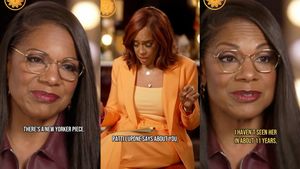Less than eight
hours after the California supreme court ruled 4-3
Thursday that gay men and lesbians are entitled to marry,
the Equality for All campaign, aimed at defeating a
likely ballot initiative that would amend the state's
constitution to ban same-sex marriage, had already
received tens of thousands of dollars in donations,
according to Lorri Jean, CEO of the Los
Angeles Gay and Lesbian Center and president of
the campaign.
But that's far
from the $20 million she estimates the campaign will need
to defeat the measure if it goes before voters in November.
"We're not starting at zero, but we have the vast
majority of the $20 million to raise," Jean told
The Advocate. The campaign raised close to
$1 million earlier this year to fund its Decline to
Sign effort to dissuade Californians from signing the ballot
petition, she says, and she estimates that cash on
hand is in the ballpark of several hundred thousand
dollars.
The campaign and
its allies will be facing well-financed foes in the
Family Research Council and VoteYesMarriage.com, the two
groups spearheading the ballot initiative. They say
they raised $2 million to subsidize the signature
drive alone, which they claim yielded more than 1.1
million signatures -- well above the 763,790 required to put
the measure on the ballot. The California secretary of
state is expected to do that formally by the end of
June, barring any unexpected signature forgeries and
the like. In post-ruling statements, both Family
Research Council and VoteYesMarriage.com said they
planned to raise at least $10 million to ensure the
initiative passes.
"We will need to
match them dollar for dollar," said Geoffrey Kors,
executive director of Equality California.
According to Kors
and Jean, the fight will be waged primarily with
television and radio advertising, which will present
personal stories of gay and lesbian Californians. "The
more people understand that this is about families and
loving couples -- not about some sort of obscure,
esoteric law -- and the more we put this personal face on
it, the more we get people to take a moment to think
about it and to have some empathy," said Kors. "Even
the ruling talks about how this is about people, not
the law."
Of course, as
inspiring as the ruling Thursday is, Jean concedes it's a
bit double-edged. On the one hand, she says, "it's causing
people to rally around a right they now have and can
lose, as opposed to something abstract." On the other
hand, the ruling might just "fire up some of the more
extreme members of our state." If the ballot initiative
wins, the consequences will be grave. To have the right to
marry and then have it taken away, said Jean, "could
stall efforts for equality for generations."
To donate, visit
equalityforall.com. (William Henderson,
The Advocate)













































































